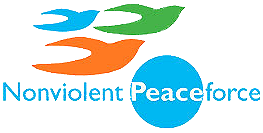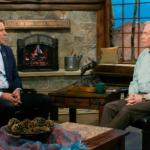 We often hear from readers about the difficulties they face teaching and preaching the power of nonviolence in places where faith in violence runs deep. During Holy Week it is especially difficult to counter the idea that God required Jesus’ death to redeem humanity from our sins. This Holy Week preachers face a double whammy as the airways echo with faith in American firepower to restore peace in places like Syria, Iraq, or Ukraine. Faith in God’s violence is matched by an equal faith in our own violence.
We often hear from readers about the difficulties they face teaching and preaching the power of nonviolence in places where faith in violence runs deep. During Holy Week it is especially difficult to counter the idea that God required Jesus’ death to redeem humanity from our sins. This Holy Week preachers face a double whammy as the airways echo with faith in American firepower to restore peace in places like Syria, Iraq, or Ukraine. Faith in God’s violence is matched by an equal faith in our own violence.
What’s a peace loving preacher to do?
I suggest that you get the help you need to build your case for nonviolence from Mel Duncan, the founder of Nonviolent Peaceforce (NP). Listen to his interview with Stephanie Van Hook and Michael Nagler of the Metta Center for Nonviolence, two incredible peacemakers in their own right. Beginning at about 16:45 minutes into the recording, you can listen as Mel brings good news straight from conflict zones like South Sudan where unarmed peacekeepers are creating safety for civilians and changing the hearts and minds of combatants. Hear his stories of hope from Syria where NP is supporting the work already being done by women and men leading peace building, human rights and reconciliation work that doesn’t make the news. And attached to the end of this article is a report about NP’s newest initiative in Ukraine where Raven Foundation is supporting the training of local leaders to operate in conflict zones to provide civilian protection, monitor human rights violations, develop early warning and response systems, and much more.
Mel Duncan and NP are part of the emerging phenomenon taking place around the globe in which unarmed responses to violence are being demonstrated to be more effective and sustainable than any military response. Even the United Nations is getting on board, working with NP to develop online training for unarmed peacekeepers that will enable anyone anywhere to be trained in nonviolent responses in their own communities. This good news is rooted in experience, objectively verifiable, and undeniably powerful. This Holy Week, we hope that the good news from NP will help you challenge the persistent depictions of violence as good or divine. For the Cross reveals the uncomfortable truth that it is humans who perpetrate violence and God who endures it and forgives us for it.
If you found this helpful in your sermon preparation, please share it with others. We’d love to hear from you about how your Easter sermon was received. Leave your comments hear or on our Facebook page.
Nonviolent Peaceforce – Report From Ukraine
After a shaky ceasefire ended in January, fighting intensified once again in Ukraine resulting in increased civilian casualties and the destruction of property before yet another ceasefire was agreed to in Minsk in early February. As of 23 January 2015, the UN Human Right Office reports that more than 5,000 people have been killed since the beginning of the violent conflict in Ukraine in mid-April of 2014 and expressed fear that the real figure may be considerably higher. Additionally, the UN Refugee Agency has estimated that internally displaced people (IDPs) number around 1,070,000. With new government elections, an increasingly destabilized economy in Ukraine, heightened tension between the West and Russia, and unpredictable pro-Russian separatist forces in the east of Ukraine, much is left to be resolved.
Nonviolent Peaceforce’s (NP) Exploration Mission to Ukraine took place in September 2014, where NP met with numerous members from the diplomatic community, civil society leaders, the United Nations and the Organization for Security and Co-operation (OSCE) in Europe mission in Ukraine. The objective of this Exploration Mission was to meet with key stakeholders and donors working in Ukraine to assess the viability of introducing an NP program in the country and determine the likelihood of funding and partnerships. NP has concluded that there is an immediate need for unarmed civilian protection work in Ukraine, especially through training concerned stakeholders who operate in conflict affected areas. NP has also identified multiple partner organizations for this project.
Starting in mid-March, NP will provide training, mentoring and guidance to various stakeholders including civil society actors, IDPs and the military on topics, strategies and methods related to each particular groups’ needs, including but not limited to: the principles of unarmed civilian protection, International Humanitarian Law, International Human Rights Law, protection of children, conflict mapping, operating in conflict zones, human rights monitoring and reporting, dialogue activities, early warning and response systems, different understandings of civilian protection, stakeholder analysis and analysis of community needs. Stressing nonviolence, non-partisanship and the primacy of local actors, the trainings will prepare participants to better protect themselves and those around them, to be able to de-escalate tensions, and to prevent further violence in their communities against civilians.
NP is currently implementing its first project, financed by the Netherlands’ Ministry of Foreign Affairs, “Enhancing Community Capacity to Reduce Violence and Protect Civilians.” This month two Training of Trainers (ToTs) will be held in cities adjacent to the conflict zone, Kharkiv and Odessa, for a total 40 participants. Participants will be active civil society actors who have been selected from communities within the conflict zone and adjacent towns.
With the help of the Raven Foundation NP will follow up with participants when they return to their communities. We will support local leaders as they organize orientation sessions for other community members and volunteers and form community based civilian protection teams. With the assistance of NP and our Ukrainian partners, community protection teams will prepare local risk analyses and develop appropriate interventions and responses.
While we are receiving positive indications from larger institutional donors for significant funding after June we will need to rely on individual donors until those funds come. NP and our partners in the Ukraine are deeply grateful to the Raven Foundation for providing us with the means to sustain this work during a critical period.















